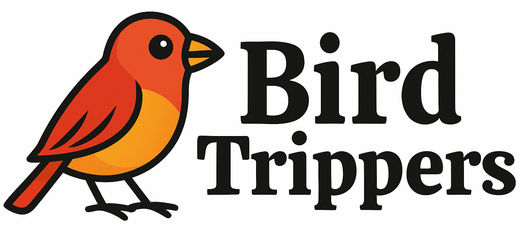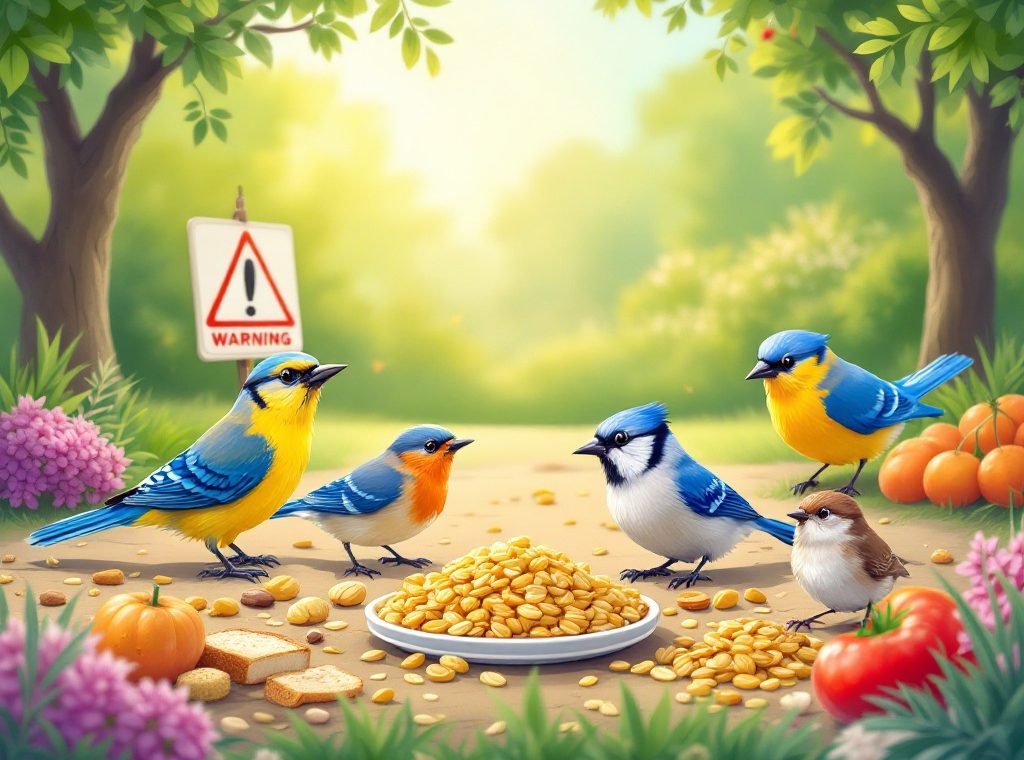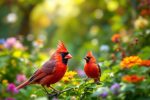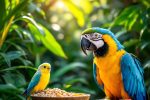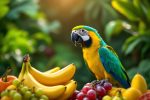Is Bad Bread for Birds: What Not to Feed Them
Did you know that feeding birds bread can actually harm them? While seemingly harmless, bread lacks essential nutrients, leading to malnutrition, obesity, and even deformities like angel wing, especially in waterfowl. Moldy bread is even more dangerous, posing a fatal risk from aspergillosis. Discover healthy alternatives like seeds, nuts, and fruits to nourish our feathered friends and help them thrive. Learn how you can make a difference by choosing the right foods and spreading awareness about responsible bird feeding practices.
Important information
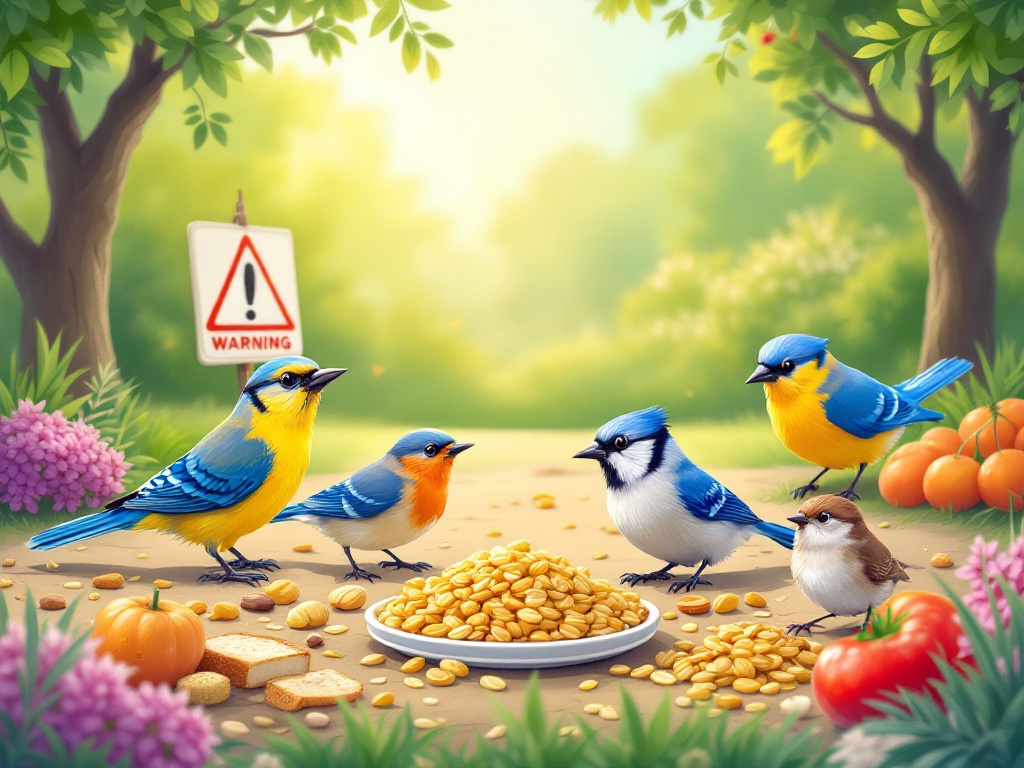
- Bread is harmful to birds as it lacks essential nutrients, leading to malnutrition, obesity, and deformities.
- Moldy bread is especially dangerous, causing aspergillosis, a fatal respiratory disease in birds.
- Healthier alternatives to bread include seeds, nuts, fruits, and insects.
- Feeding bread to waterfowl can cause Angel Wing, a deformity that prevents flight.
- Overfeeding birds in public spaces can lead to overpopulation, disease transmission, and environmental problems.
Is Bread Bad for Birds?
Feeding bread to birds can be harmful to their health. Bread lacks essential nutrients, filling them up with empty calories that can lead to malnutrition, obesity, and deformities like angel wing. Moldy bread is especially dangerous, as it can cause aspergillosis, a fatal respiratory disease. Birds thrive on a balanced, nutrient-rich diet. Healthier alternatives include seeds, fruits, nuts, and insects, which are crucial for their growth and development. Instead of bread, consider offering these healthier options.
Why Bread is Considered Junk Food for Birds
Feeding bread to birds can be harmful. Bread, primarily composed of carbohydrates, lacks essential nutrients, potentially leading to malnutrition, especially in young birds. It can also swell in their stomachs, causing digestive issues. While small birds may fill up on bread, it doesn’t provide enough energy to survive harsh weather conditions. For waterfowl, bread can cause Angel Wing, a deformity that hinders flight. Moldy bread is particularly dangerous, as it can cause aspergillosis, a fatal respiratory disease. Therefore, it’s best to avoid feeding bread to birds and opt for healthier alternatives.
Health Risks of Feeding Bread to Birds
Feeding bread to birds can harm their health. It lacks essential nutrients, leading to malnutrition and deformities like Angel Wing, especially in waterfowl. Moldy bread is even more dangerous, as it can contain Aspergillus, a fungus that causes respiratory illness. A diet filled with bread also weakens their immune system, making them more vulnerable to diseases. Consider these healthier alternatives to bread:
- Cracked corn provides energy and is easy to digest.
- Sunflower seeds offer essential fats and protein.
- Nyjer seeds are tiny, black seeds rich in nutrients.
- Millet is a good source of carbohydrates and protein.
- Mealworms are protein-rich, particularly beneficial during nesting season.
Malnutrition and Nutritional Value Concerns
Feeding birds bread can be detrimental to their health. Bread is deficient in essential nutrients such as protein, vitamins, and minerals, which birds need for proper growth, bone development, and overall well-being. A diet primarily consisting of bread can cause malnutrition and deformities like Angel Wing, especially in waterfowl. Consequently, it’s advisable to refrain from feeding bread to birds.
Angel Wing Syndrome in Waterfowl
Angel wing, also known as airplane wing or slipped wing, is a developmental deformity observed in waterfowl like geese, ducks, and swans. This condition causes the last joint of the wing to twist outward, hindering proper feather development and rendering the birds flightless. A high-carbohydrate diet, often resulting from excessive bread consumption, fuels rapid growth that surpasses nutrient absorption. Consequently, essential nutrients such as vitamins D and E, vital for bone health, become deficient. Grounded and vulnerable, these birds face heightened risks of predation and other hazards.
Risks of Mold and Aspergillosis
Moldy bread is dangerous for birds and can cause aspergillosis, a fatal respiratory disease. This infection is caused by *Aspergillus fumigatus*, a fungus that grows in mold. When birds inhale the spores from this fungus, they can develop lung infections. Therefore, never feed moldy bread to birds.
What Foods Should Not Be Fed to Birds?
Feeding birds can be enjoyable, but it’s crucial to offer them safe and nutritious foods. Avoid processed foods like chips, cookies, and candy, as they lack nutritional value. Some foods are toxic to birds, including chocolate, caffeine, alcohol, avocados, onions, garlic, and apple seeds. Limit salty, sugary, and fatty foods to prevent health problems. Never give birds moldy or rotten food. A balanced diet for birds includes seeds, nuts, fruits, and vegetables. Sunflower seeds, berries, and leafy greens are excellent choices. You can also offer specialized bird feed blends formulated for specific species.
Processed and Junk Foods
Processed foods offer minimal nutritional value and pose significant health risks to birds. High sodium levels in foods like potato chips, pretzels, and crackers can dehydrate birds and lead to kidney problems. Junk food lacks essential nutrients, weakening their immune systems and increasing their vulnerability to diseases. These poor diets contribute to obesity, heart disease, and other health complications.
Harmful Processed Foods
- potato chips,
- pretzels,
- crackers.
Healthier Alternatives
- seeds,
- fruits,
- vegetables,
- cooked rice,
- leafy greens (in moderation).
Unsafe Foods for Birds
Certain foods can be detrimental to birds’ health. Avoid giving your bird chocolate, caffeine, and alcohol, as these substances are toxic. Similarly, avocados, salty snacks, sugary treats, and processed foods offer little nutritional value and can be harmful. Never give spoiled or moldy food to birds, as it can be fatal.
All types of bread, including white, whole grain, and processed varieties, are detrimental to a bird’s diet. Bread lacks essential nutrients and can expand in their stomachs, causing severe digestive issues. Moldy bread is particularly dangerous and can cause aspergillosis, a deadly fungal infection. Prioritize appropriate bird food to maintain your feathered friend’s health.
Feeding Birds in Public Spaces
Feeding birds in public spaces, while seemingly kind, can create several problems. Overfeeding leads to unusually large flocks, increasing disease transmission. Leftover food attracts pests and creates unsanitary conditions as it decomposes and pollutes water sources. Additionally, easy access to food can make birds reliant on handouts, hindering their natural foraging skills. A better way to support birds and the environment is by planting native plants that provide natural food sources, allowing birds to flourish.
Risks of Public Feeding
Feeding birds, while seemingly kind, can create unintended problems. Overpopulation is a major concern, as birds can become reliant on supplemental feeding. This dependence becomes dangerous if the food source vanishes, leading to potential starvation. Furthermore, large flocks at feeders increase the risk of disease spread. Bird droppings can contaminate water, creating unhealthy conditions. Leftover food may also attract unwanted pests like rodents.
Alternatives to Bread
Birds enjoy a variety of foods beyond bread. Excellent choices include sunflower seeds, millet, and peanuts. Fresh fruits like apples, berries, and bananas are also appealing. Leafy greens such as spinach and carrots provide essential vitamins. Suet, a rich source of fats and proteins, offers crucial sustenance, especially in winter. Commercial birdseed blends cater to the specific dietary needs of different species. All these options deliver vital nutrients for healthy birds.
Raising Awareness
Feeding birds bread can harm their health. Bread lacks nutritional value and can cause health problems, especially for waterfowl. We need to educate the public through awareness campaigns, park signs, and online resources. These initiatives encourage responsible bird feeding.
Why Bread is Bad for Birds
Bread offers very little nutritional value for birds. It can lead to malnutrition, deformities like angel wing, and other health issues. Feeding bread also encourages overcrowding at unnatural feeding sites, disrupting the natural ecosystem.
Healthy Alternatives to Bread
Instead of bread, offer nutritious alternatives. Birdseed, nuts, and fruit provide essential vitamins and minerals. These foods contribute to a healthier bird population and a more balanced ecosystem.
- birdseed,
- nuts,
- fruit.
Spread the Word
Share this information with friends, family, and your community. Increased awareness promotes responsible bird feeding practices.
Support Educational Initiatives
Support organizations that promote bird conservation and responsible feeding practices. Your contribution can make a significant difference.
Choose Healthy Bird Food
Opt for nutritious options like birdseed, nuts, and fruit instead of bread. This simple choice helps protect our feathered friends.
Why People Need to Know Bread is Bad for Birds
Feeding bread to birds can cause malnutrition and other health problems because it lacks essential nutrients. Birds need a balanced diet to thrive. Protecting bird populations requires public awareness. Educational campaigns can highlight bread’s negative impact and suggest healthier alternatives, such as birdseed. Birdseed provides the necessary nutrients for a healthy ecosystem and birdlife. Choosing nutritious food for birds makes a significant difference.
Encouraging Healthy Feeding Habits
Feeding birds properly is vital for their health. Many people unintentionally give birds harmful foods like bread. Instead, choose nutritious options such as birdseed, fruits, and nuts. These foods provide essential nutrients for birds. Responsible feeding practices, along with healthy food choices, minimize health risks and help bird populations thrive.
